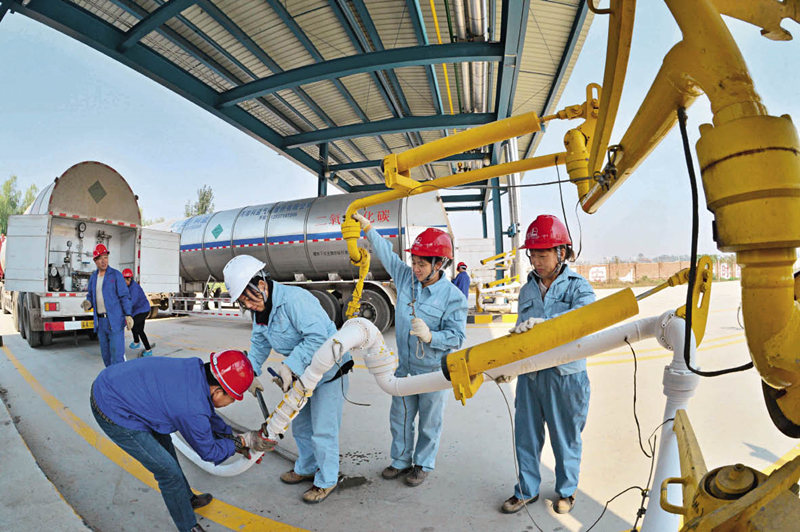China Plays Growing Role in Global Governance
China Today by Wang Yiwei, December 20, 2016 Adjust font size:
Promoting Fairness in Global Governance
At the Fifth Plenary Session of the 18th CPC Central Committee, the Chinese authorities adopted the five development concepts of innovation, coordination, green development, opening-up, and sharing. They are increasingly acknowledged by the international community.
China also believes that it is necessary to advocate the practice of common, comprehensive, cooperative and sustainable security in Asia. This has been demonstrated as having positive effects, encouraging Asia and even the world to abandon the Cold War mentality and zero-sum ideology.

China’s Sinopec is overseeing implementation in Puyang City, Henan Province, of a project to recycle 100,000 tons of liquid carbon per year. Sinopec technicians are shown making preparations to transport newly produced liquid carbon dioxide to an oil-drilling field.
China has long upheld the idea whereby “the world is for all,” and actively participated in making rules for governance in emerging concerns, including oceans, the polar regions, the Internet, space exploration, nuclear safety, anti-corruption, and climate change, with the aim of making global governance fairer and more appropriate. A new type of international relations promoting win-win cooperation and the vision of a global partnership is shaping a new model of international cooperation.
Since the 18th National Congress, the CPC has advocated upholding the correct approach to justice and interests, giving priority to justice, so promoting a new type of international relationship featuring win-win cooperation, as well as creating a community of shared future for humankind, building a global partnership network, and encouraging a common, comprehensive, cooperative and sustainable security concept. China’s proposals and efforts have been welcomed by the international community.
In 2016, China successfully hosted the G20 Summit in Hangzhou City. At the summit, Xi Jinping expounded on China’s outlook on global economic governance. The G20 Hangzhou Summit took innovation as a core achievement, highlighted the development policy in global macroeconomic policy coordination, formed a multilateral framework for investment principles, released a Presidency Statement on Climate Change, and included green finance on the G20 Summit agenda, all for the first time.
The G20 Hangzhou Summit marks a turning point in the transformation of global governance. China’s stance and action has shown that it has paid greater attention to global governance and become more confident and capable in promoting cooperation amongst large countries to enhance global coordination, safeguard world peace, and form a fairer world order.
Global governance shouldn’t mean that the U.S. or the West governs the world, but that the world should be governed and managed by all countries. The participation of developing countries is especially important as they represent the most people. Global governance means collective action that is adopted to deal with global challenges according to the United Nations Charter and other accepted principles of international relations. Global governance must be conducted by all peoples. As an ancient Chinese saying goes, “When the great way is followed, all under heaven will be equal.”
Wang Yiwei is director of the Institute of International Affairs at Renmin University, and a senior researcher with Chongyang Institute for Financial Studies.
